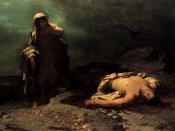Antigone Tragic Hero Essay
Antigone is not a tragic hero for three main reasons: her fall was not from a position of greatness or nobility; she chose her actions with full awareness of the consequences; and her actions did not cause her to make a huge discovery about herself. Because of these factors, what happens to Antigone is not a tragic downfall, but more so the result of a deliberate course of action.
Before Antigone was condemned to death, she was not in a high-ranking position in society. Although she was the niece of Creon, the king, her place was not one of prestige. As his niece, he could have given her a pardon. However, Creon made it clear that she had no special status when he said "I swear I hardly care if she be my sister's child or linked to me by blood more closely than any member of my hearth and home" (p.
211). Despite her royal blood, Antigone did not have political influence. Essentially, her place in society stayed the same throughout the story. If Creon had been giving her special treatment or administrative power, which she lost by burying Polyneices, she would have fit this particular criterion for a tragic hero.
In order for a protagonist to be considered a tragic hero, they must have some tragic flaw, which leads them unknowingly to their downfall. Not only did Antigone know what would happen to her, but she also met her end because of bravery, family loyalty, and stubbornness. It could be argued that Antigone was out of line in burying Polyneices, because women were not supposed to interfere with politics. Regardless, this would not make her a tragic hero. A tragic hero needs more than a flaw--the flaw needs to be one...


